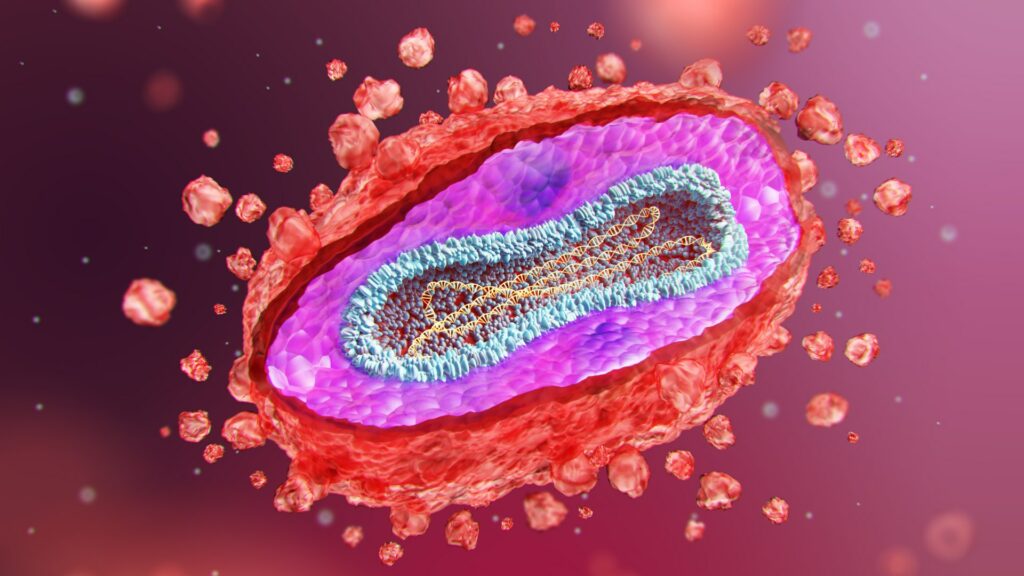3
The disease can causes flu-like symptoms and pus-filled lesions
3
The skin rash or pus-filled lesions can last two to four weeks
Mpox, previously called monkeypox, is a viral infection that causes flu-like symptoms and pus-filled lesions.
The new clade 1b variant started spreading rapidly in the Democratic Republic of Congo (DCR) last year.
Since then, it has spread internationally, reaching as far afield as Sweden in August and Thailand and another in India earlier this month.
The new German case, detected on October 18, was contracted abroad, Germany’s Robert Koch Institute (RKI) confirmed on Tuesday.
“The RKI continues to monitor the situation closely and adjusts its assessment to the current state of knowledge if necessary,” the agency said.
The Swedish case – which marked the first time the strain has reached Europe – prompted the UK Health Security Agency (UKHSA) to ramp up its preparedness ahead of a possible outbreak.
As part of this, it has ordered more than 150,000 doses of mpox vaccine from biotechnology firm Bavarian Nordic to ensure high-risk groups are protected.
At least 1,000 deaths have been reported across Africa as of last week, prompting the World Health Organisation (WHO) to declare the increasing spread of the disease a global health emergency for the second time in two years.
Most of the cases have been recorded in DRC, which has seen a total of 5,399 cases and 25 deaths in 2024 up to September 15.
Almost 800 cases of mpox have been confirmed there in the past four weeks, according to WHO, but 18 out of 55 African countries are battling outbreaks of the illness.
+++ LEGAL REMOVAL +++ Inside makeshift mpox isolation wards where hundreds of feverish patients fill the floors as desperate medics grapple life-threatening drug shortages
The total number of suspected cases in Africa since the beginning of the year now stands at 42,438, with 8,113 confirmed as mpox, according to the Africa Centres for Disease Control and Prevention.
Mpox mostly spreads via close contact with infected people, including through sex.
Common symptoms include a skin rash or pus-filled lesions which can last two to four weeks.
It also can cause fever, headaches, muscle aches, back pain, low energy and swollen lymph nodes.
Most cases are mild but it can be deadly.
Earlier this year, scientists discovered a new form of the disease, clade 1b.
They said that it may cause milder symptoms that clade 2 which triggered the mpox public health emergency in 2022.
However, the new version of the bug is believed to spread more easily through close contact – and could even be more deadly.
It’s thought to have a fatality rate of around five per cent in adults and 10 per cent in children, compared to three per cent for its predecessor.
Mpox is a viral disease that occurs mostly in central and western Africa.
Who can get the mpox vaccine?
The NHS is offering the smallpox (MVA) vaccine to people who are most likely to be exposed to mpox.
People who are most likely to be exposed include:
Gay, bisexual, or other men who have sex with men (GBMSM)Some health workers that work on infectious disease inpatient units and sexual health servicesSome health and aid workers travel to affected countries to work within mpox response or sites with active outbreaksClose contacts of confirmed cases
The NHS mpox outbreak vaccination programme is currently only available in London and Greater Manchester, to people who live or travel to have sex there.
Healthcare workers will usually be offered two doses of the vaccine.
Men who are gay, bisexual or have sex with other men will be offered 2 doses of the vaccine. The 2nd dose will be offered from 2 to 3 months after the 1st dose.
Your local NHS services will contact you when you can get your 2nd dose.
It was first identified in laboratory monkeys, according to the US Centres for Disease Control and Prevention (CDC).
Currently there is no treatment approved specifically for mpox virus infections, according to the CDC.
However, a two-dose vaccine has been developed to protect against the virus.
Source link : https://www.the-sun.com/health/12734157/killer-mpox-strain-germany-europe-vaccines/
Author :
Publish date : 2024-10-23 11:00:00
Copyright for syndicated content belongs to the linked Source.
